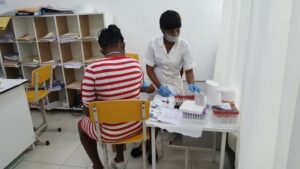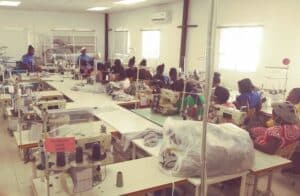Delmas, Haiti – Dieunese, a textile factory worker, is on maternity leave for her third child since joining the factory as a worker when it opened four years ago. She shares her experience that the pandemic is detrimental to women workers, in particular pregnant women. “I saw other pregnant women lose their jobs because of the closing of their modules, and others were put in the rotation due to lack of production demand. ”
Dieunese’s job has been spared during the economic repercussions of the COVID-19 pandemic, but job security is scarce. According to ADIH (Association of Industries of Haiti), the garment sector accounts for around 57,000 jobs in Haiti and 90% of the country’s exports. In a COVID-19 economic impact survey conducted by Better Work Haiti at the end of 2020, among 3,330 workers (64% women) in 38 factories, pregnant women, an already vulnerable group, reported experiencing financial disruption in their income and difficulty paying expenses to cover their cost of living.
In this crisis context, the ILO, through the Better Work Haiti programme, has collaborated with UNICEF to initiate a pilot project for the benefit of women workers in the apparel sector, which includes sensitivity training on issues of pregnancy and contraception prenatal consultation, access to reproductive health services, and health care for pregnant women who test positive for HIV/AIDS. This project has been implemented by Profamil at the factory level, and it was extended from December 2020 into 2021, to continue to meet the demand for these crucial services. This initiative provides immediate assistance to pregnant women in the sector who, due to the drastic slowdown in economic activities, can no longer afford certain health services. Through this initiative, 18,853 workers were reached, either through healthcare kiosks or other centers throughout the Sonapi Industrial Park. “Accessibility to health care in relation to its availability remains a challenge, despite the many health institution partners affiliated with these factories,” says Gianni DeCastro, the Executive Director of PROFAMIL. “This is especially true in the midst of the COVID-19 crisis.”

Kelonis, another female worker that is two months pregnant, has found the pilot programme to be a lifeline. “Without this activity within the factory,” she says, “I would have had to find the time and money for the exams in a private hospital, where the services are expensive.” This is Kelonis’ second child, and she has benefited from several services offered by the project. “I was able to have several examinations performed, including urine and blood tests, an initial pregnancy test, pap smear, and an HIV test. It is through this service that my pregnancy was confirmed.”
Despite pandemic conditions, the pilot has been able to reach a high volume of women: prenatal care services were offered to 282 pregnant women in the factories, who benefited from two prenatal consultations, including 276 who benefited from ultrasound and 232 who benefited from routine examinations and prenatal follow-up visits. The awareness and sensitivity sessions were carried out directly within the factories, either in small groups or throughout the factory sound system. During her pregnancy, Dieunese used the bus as her primary transportation and was often late to her regular visits to the doctor. She was eager to have her suspicions that she was pregnant with a boy confirmed, but she was afraid that her lateness would prevent her from being seen by the doctor. “Thanks to the services provided by Profamil, I felt reassured that I would receive medical consultation and an ultrasound examination, which reassured me about the state of my pregnancy. The services were quick and easy. I felt that there was a kind of special attention to pregnant women in the factory.” Dieunese was happy to have confirmed that she has a healthy pregnancy and would be giving birth to a boy.
According to Dieunese, these Better Work-UNICEF services provided through Profamil have eased some of the common worries of pregnant women who are also working. “I know a lot of other pregnant women like me who have been able to have ultrasound exams to check on their babies. I used the result and the certificate that was provided to me at the factory’s HR department to secure my maternity leave. Otherwise, we would have rushed with for documentation through government insurance or struggled to find the money to pay a private doctor for the paperwork that we instead got for free, and immediately, through this programme.” With the unique demands of working in the textile sector, where activities in factories during operating hours can have an impact on the production chain, Better Work has engaged with employers and Profamil to find practical, healthy solutions to mitigate negative impacts on pregnant workers. These measures include increasing the duration of the production timeline, requiring lunch breaks, setting up mobile clinic kiosks, and integrating the factory health care staff in the mobile service provision, in order to ensure the continuity of this initiative in the factory.
“The strategy of offering local and mobile services has been an innovative strategy and very much suited to the context,” says DeCastro.

According to Better Work Haiti’s latest compliance report, 67% of monitored workplaces in 2020 do not have medical facilities and onsite staff, and 84% have continuing social security and benefits issues that affect workers. By collaborating with other ILO departments, other UN agencies like UNICEF, and national partners, the programme aims to effectively build strong partnerships to address persistent critical issues in the sector, like the health of pregnant workers.
The initial conclusions on this pilot project demonstrate the immediate need for access to health care for a considerable portion of the 65% of women workers in Haiti’s textile sector. These women are at the forefront of providing a boost to the Haitian economy, and Better Work Haiti aims to protect not just their livelihood, but the quality of their lives.